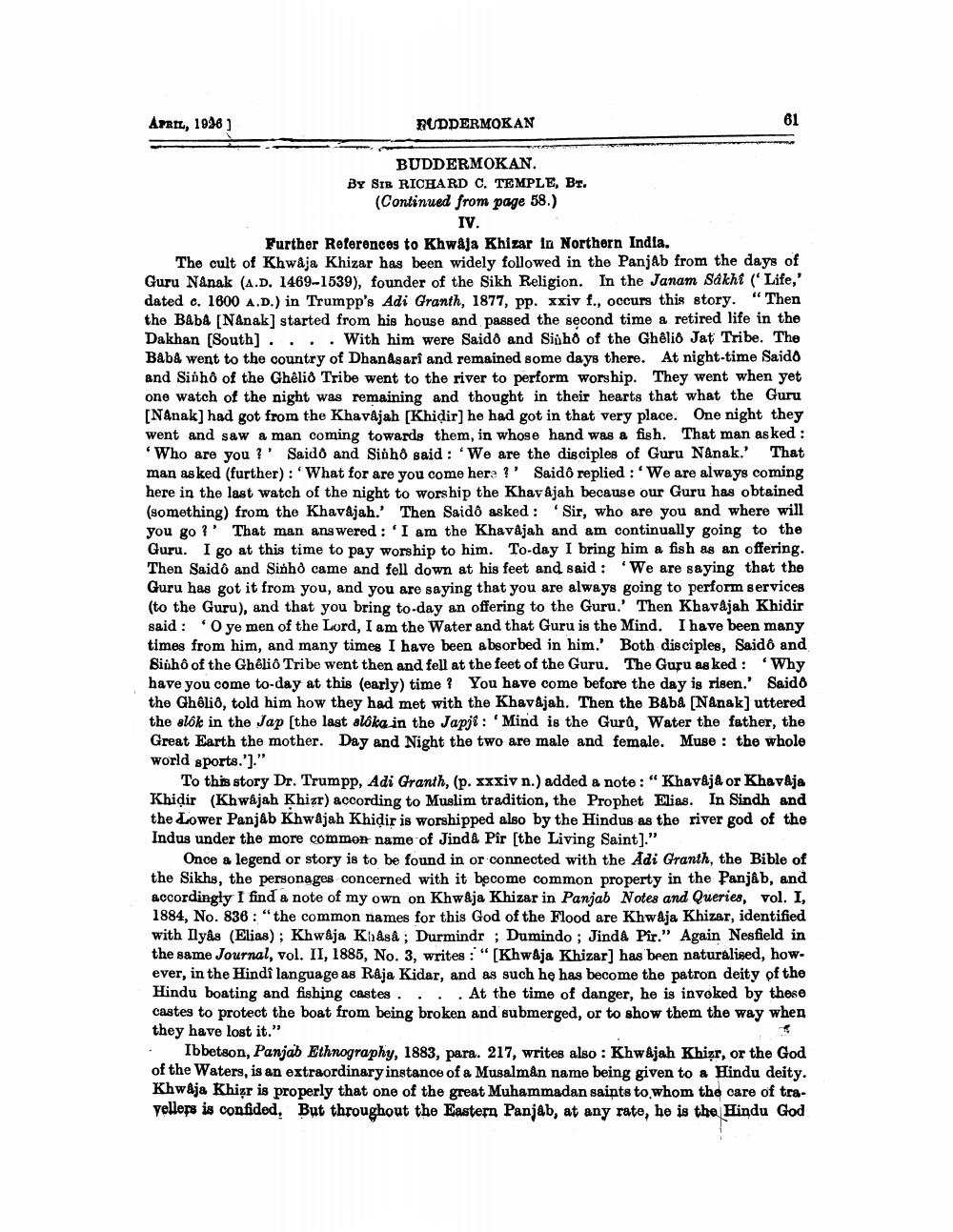________________
Ametz, 1928)
HUDDERMOKAN
.
BUDDERMOKAN. BY SIR RICHARD C. TEMPLE, Br. (Continued from page 58.)
IV. Further References to Khwaja Khizar in Northern India. The cult of Khwaja Khizar has been widely followed in the Panjab from the days of Guru Nanak (A.D. 1469-1539), founder of the Sikh Religion. In the Janam Sakhi ('Life,' dated c. 1600 A.D.) in Trumpp's Adi Granth, 1877, pp. xxiv f., occurs this story." Then the Baba [Nanak] started from his house and passed the second time a retired life in the Dakhan (South). ... With him were Saidd and Sinhỏ of the Ghélio Jat Tribe. The Baba went to the country of DhanAsari and remained some days there. At night-time Saido and Sióho of the Ghélio Tribe went to the river to perform worship. They went when yet one watch of the night was remaining and thought in their hearts that what the Guru [Nanak) had got from the Khavájah (Khidir] he had got in that very place. One night they went and saw a man coming towards them, in whose hand was a fish. That man asked:
Who are you?' Saido and Sinho said: 'We are the disciples of Guru Nanak. That man asked (further): 'What for are you come here ?' Saidô replied: We are always coming here in the last watch of the night to worship the Khav &jah because our Guru has obtained (something) from the Khavajah.' Then Saidô asked: "Sir, who are you and where will you go ? That man answered: 'I am the Khavajah and am continually going to the Guru. I go at this time to pay worship to him. To-day I bring him a fish as an offering. Then Saidô and Sinhd came and fell down at his feet and said: "We are saying that the Guru has got it from you, and you are saying that you are always going to perform services (to the Guru), and that you bring to-day an offering to the Guru.' Then Khavajah Khidir said: 'Oye men of the Lord, I am the Water and that Guru is the Mind. I have been many times from him, and many times I have been absorbed in him.' Both disciples, Saidô and Sinhô of the Ghélio Tribe went then and fell at the feet of the Guru. The Guru asked: 'Why have you come to-day at this (early) time? You have come before the day is risen.' Said the Ghêlio, told him how they had met with the Khavajah. Then the Baba [Nanak] uttered the alóle in the Jap (the last alóka in the Japji: Mind is the Guru, Water the father, the Great Earth the mother. Day and Night the two are male and female. Muse: the whole world sports.']."
To this story Dr. Trumpp, Adi Granth, (p. xxxiv n.) added a note : " Khavåjå or Khav&ja Khidir (Khwajah Khirr) according to Muslim tradition, the Prophet Elias. In Sindh and the Lower Panjab Khwajah Khidir is worshipped also by the Hindus as the river god of the Indus under the more common name of Jinda Pir [the Living Saint]."
Once a legend or story is to be found in or connected with the Adi Granth, the Bible of the Sikhs, the personages concerned with it become common property in the Panjab, and Accordingly I find a note of my own on Khwaja Khizar in Panjab Notes and Queries, vol. I, 1884, No. 836 : "the common names for this God of the Flood are Khwaja Khizar, identified with Ilyas (Elias) ; Khwaja Kas& ; Durmindr ; Dumindo : Jinda Pir." Again Nesfield in the same Journal, vol. II, 1885, No. 3, writes :" [Khwaja Khizar] has been naturalised, however, in the Hindi language as Raja Kidar, and as such he has become the patron deity of the Hindu boating and fishing castes.... At the time of danger, he is invoked by these castes to protect the boat from being broken and submerged, or to show them the way when they have lost it." • Ibbetson, Panjab Ethnography, 1883, para. 217, writes also : Khwajah Khiar, or the God of the Waters, is an extraordinary instance of a Musalman name being given to a Hindu deity. Khwaja Khiţr is properly that one of the great Muhammadan saints to whom the care of travellers is confided, But throughout the Eastern Panjab, at any rate, he is the Hindu God




